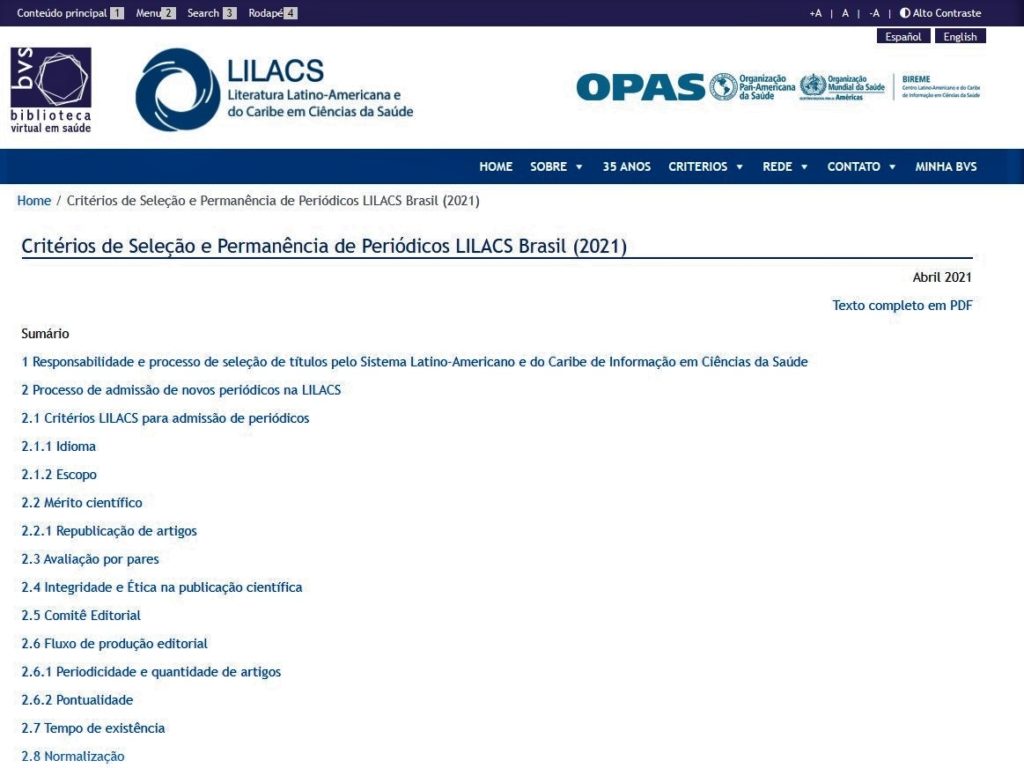Selection and permanence criteria for LILACS Brazil journals are updated
29 de May de 2021The selection and permanence criteria for LILACS journals in the Brazil collection were updated in order to align them with the LILACS criteria in force throughout Latin America and the Caribbean and with the editorial and scientific communication processes provided for in Open Science. The document was also restructured to make it easier to understand its application in the evaluation and selection process of journals, carried out annually.
The new criteria take effect as of July 2021 and will be considered as the current criteria for the journal evaluation process from this year onwards (2021).
Performance of Committee members
The revised criteria document was shared by the BIREME Referential Information Sources team and the Committee members reviewed and suggested inclusion of criteria, and the document was consolidated in two meetings.
The following Committee members participated in the discussion and consolidation:
Acácia Aparecida Angeli dos Santos, from Universidade São Francisco, representative member of the Psychology field; Adeilton Alves Brandão, from Fundação Oswaldo Cruz, representative member of the Biomedical Sciences field; André Luiz Félix Rodacki, from the Universidade Federal do Paraná, member representing the field of Physical Education (Speech Therapy, Physical Education, Physiotherapy, Occupational Therapy and Sports Medicine); Edna Frasson de Souza Montero, from Universidade de São Paulo, member representing the field of Clinical and Surgical Medicine; Elizabeth Igne Ferreira, from the Universidade de São Paulo, representative member of the Pharmacy field; Maria Helena Palucci Marziale, from the Universidade de São Paulo, member representing the field of Nursing; and Sigmar de Mello Rode, from the Universidade Estadual Paulista Júlio de Mesquita Filho, representative member of the Dentistry field.

The main updates refer to:
- Scientific merit remains the main factor for indexing a journal in LILACS and the percentage of 50% of original articles was maintained, but systematic reviews are included in the count.
- Journals that accept preprints are accepted and their publication is not considered republication.
- Peer review must be formally specified, indicating the type of assessment performed, whether single blind, double blind or open
- Considering integrity and ethics in scientific publication, in addition to the international standards indicated, the journal must make explicit in the Instructions to authors its commitment to observing these good practices and the adoption of a similarity detection program or tool is recommended.
- Quarterly frequency desired, or continuous publication, and a minimum number of 40 articles published per year
- Punctuality in publication, especially in cases of continuous publication; the publication of articles throughout the year will be observed, avoiding the concentrated publication of articles
- Standardization that favors the publication of natively electronic journals and focuses on the article as an individual digital object, which foresees persistent numbers such as DOI, ORCID, e-location, Creative Commons license, machine-readable descriptive metadata
- Specifically regarding Open Science, indication of acceptance criteria for manuscripts deposited in a preprint server; CC-BY license recommended; guidelines on identification, referencing, and availability of data used and generated by the research for the purposes of evaluation, reuse, and reproducibility.
 The criteria for selection and quality assessment of journals indexed in LILACS must be continuously updated to promote the adoption of good international editorial practices and contemplate changes in scientific communication.
The criteria for selection and quality assessment of journals indexed in LILACS must be continuously updated to promote the adoption of good international editorial practices and contemplate changes in scientific communication.
Open Science, despite being disseminated and having more “widespread” areas such as open access, is still not a reality if the formal and practical aspects of its implementation are analyzed. The open evaluation process, or even carried out post-publication as in the case of preprints, the deposit of research data, the reproducibility and transparency of research published in journals are themes explored in the virtual sessions on good practices in the editorial processes of scientific journals for LILACS with the objective of spreading them, and it is necessary to monitor the editorial teams more closely so that these practices can be implemented in their journals.
Relevant links
BIREME/PAHO/WHO. LILACS – Criteria for Selection and Permanence of Journals (2020). Available at: https://lilacs.bvsalud.org/es/revistas-lilacs/lilacs-criterios-de-seleccion-y-permanencia-de-revistas-2020/
BIREME/PAHO/WHO. Selection and Permanence Criteria for LILACS Brazil Journals (2021). Available at: https://lilacs.bvsalud.org/periodicos-lilacs/criterios-de-selecao-e-permanencia-de-periodicos-lilacs-brasil-2021/
BIREME/PAHO/WHO. Webinars on Good Practices in the Editorial Processes of Scientific Journals for LILACS (2021). Available at: https://lilacs.bvsalud.org/es/sesiones-virtuales-lilacs/buenas-practicas-en-los-procesos-editoriales-de-revistas-cientificas-para-lilacs-2021/

